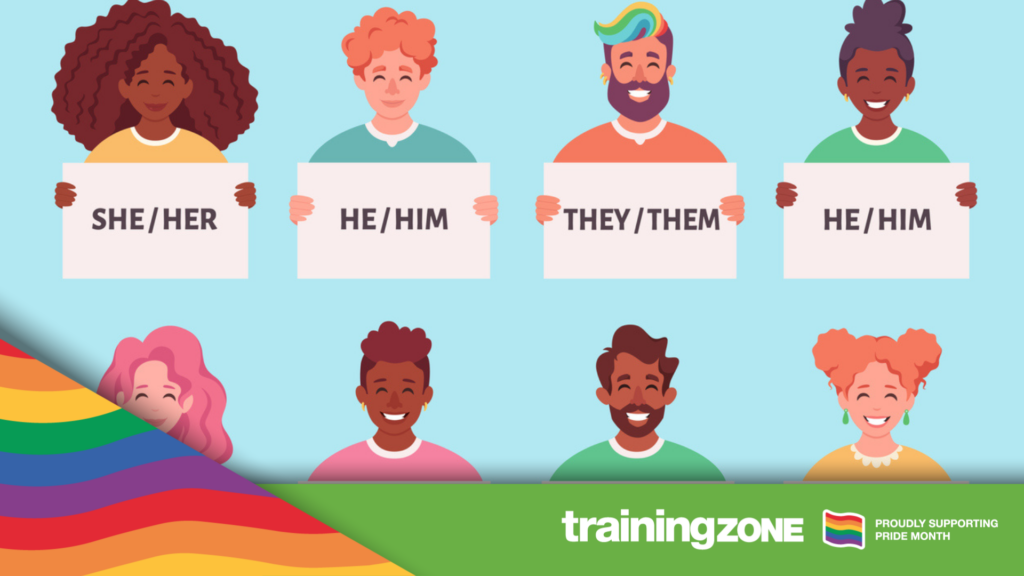Pride celebrates how far the community has come whilst reminding us of how far we still have to go to achieve full LGBT+ inclusivity.
We support Pride to demonstrate a commitment to diversity and inclusion for LGBTQ+ colleagues in the workplace. It also shows that companies are willing to invest in their employees and create an environment where everyone can succeed.
There are many ways for L&D to play their part in promoting and supporting Pride events and by taking these steps, L&D can show their commitment to LGBTQ+ individuals and create more inclusive workplaces for all, not only for the month of June – but all year round.
- Bring in external speakers to inspire and share their lived experiences.
- Support and sponsor employee involvement in local Pride events and initiatives.
- Ensure that company policies are inclusive of all employees, regardless of sexual orientation or gender identity.
- Provide specific training on LGBTQ+ inclusion for all employees.
- Create an employee resource group for LGBTQ+ employees.
- Actively take steps to understand the importance of identity for the community.
Misgendering and not including people in the category they identify in can make them feel not accepted, validated, included or good enough.
This is your identity
If a pronoun is simply a way to refer to someone instead of using their name, why does it increasingly need to be a consideration for L&D professionals and employees? The LGBTQ+ community is often still facing discrimination, isolation, poor opportunities, but not using the correct pronouns has a profound effect on inclusion in the workplace.
Many in the LGBTQ+ community may not align with typical gender stereotypes and choose to use alternative pronouns to avoid being misgendered. For example, non-binary individuals don’t identify as male or female so tend to use the gender pronouns ‘they/them/their’. Using the correct pronoun is showing you respect and accept an individual’s right to be as they authentically are.
Misgendering and not including people in the category they identify in can make them feel not accepted, validated, included or good enough. Look at it from a different perspective.
If you are cisgender imagine being called a gender that you are not. No one wants that because we want to be identified as we truly are.
Create a safe space so everyone can bring their authentic self to work.
How to build an inclusive culture using inclusive pronouns
Normalise discussions about gender. This will help create an inclusive and supportive work environment for everyone, and in particular transgender and non-binary people as it can reduce the burden on them to explain their identity repeatedly.
Respect there are different stages of gender and sexual orientation. For some sharing their pronouns is easy and they feel confident doing so, whilst others fear discrimination or could be at a different stage of their gender identification and they may need more time. Just be sure that the business culture is ‘all are welcome’.
Find out a person’s pronouns. Using the correct pronouns for someone shows you don’t make assumptions about gender, want to reduce misgendering (accidental or not), you care about how each of us identify differently, and it is an important move towards better inclusivity.
Add your pronouns to your email signature. More people are adding their pronouns to their email signature to avoid being misgendered, signalling you will also respect the email recipients gender identity and choices, or as a simple show of support and allyship to the community. LinkedIn provided a section on profiles so you are able to state your pronouns and this is slowly but inevitably occurring elsewhere.
Equally, let your staff know they can (if they wish) add their pronoun to their email signature. This means that anyone can clarify how they would like to be referred to and that all genders are respected. Society’s attitude is changing towards the community and respecting pronouns is a valuable way for businesses to stay current as well as inclusive.
Be language aware. For example, addressing an audience using ‘ladies and gentlemen’ is outdated and insulting for many people in the community. We need awareness about contemporary language.
Don’t question the use of ‘they’ as a singular pronoun. Be mindful not to question their use of ‘they’ or tell them it’s ‘incorrect English’, just accept and use what makes those individuals feel most included. If you accidentally use the wrong pronouns, just apologise and try your best not to do it again.
Change your corporate wording. Update the wording in all marketing collateral and business material to encompass all gender identities including providing an option not to say, as not everyone is comfortable sharing.
Create a safe space so everyone can bring their authentic self to work. This means that individuals do not need to censor or hide parts of themselves and as a result the business itself will benefit from better productivity, creativity and teamwork as employees bring their authentic selves to work.
Celebrate people’s differences. Honour diversity, not least because it increases productivity, creativity, curiosity, promotes new thinking, creates a healthier working environment, promotes respect and reduces bullying and harassment.
Pronouns: A matter of Pride
This decade will increasingly see a movement towards the importance of pronouns, both for trans and non-binary equality and to increase discussions about gender, which is something that benefits everyone. At a business level, this type of inclusion can represent a powerful cultural shift in organisations and an awareness that is thankfully growing – the need for and provision of a safe work culture.
LGBTQ+ Glossary of terms: https://seechangehappen.co.uk/lgbtq-glossary
Pride celebrates how far the community has come whilst reminding us of how far we still have to go to achieve full LGBT+ inclusivity.
We support Pride to demonstrate a commitment to diversity and inclusion for LGBTQ+ colleagues in the workplace. It also shows that companies are willing to invest in their employees and create an environment where everyone can succeed.
There are many ways for L&D to play their part in promoting and supporting Pride events and by taking these steps, L&D can show their commitment to LGBTQ+ individuals and create more inclusive workplaces for all, not only for the month of June – but all year round.
- Bring in external speakers to inspire and share their lived experiences.
- Support and sponsor employee involvement in local Pride events and initiatives.
- Ensure that company policies are inclusive of all employees, regardless of sexual orientation or gender identity.
- Provide specific training on LGBTQ+ inclusion for all employees.
- Create an employee resource group for LGBTQ+ employees.
- Actively take steps to understand the importance of identity for the community.
Misgendering and not including people in the category they identify in can make them feel not accepted, validated, included or good enough.
This is your identity
If a pronoun is simply a way to refer to someone instead of using their name, why does it increasingly need to be a consideration for L&D professionals and employees? The LGBTQ+ community is often still facing discrimination, isolation, poor opportunities, but not using the correct pronouns has a profound effect on inclusion in the workplace.
Many in the LGBTQ+ community may not align with typical gender stereotypes and choose to use alternative pronouns to avoid being misgendered. For example, non-binary individuals don’t identify as male or female so tend to use the gender pronouns ‘they/them/their’. Using the correct pronoun is showing you respect and accept an individual’s right to be as they authentically are.
Misgendering and not including people in the category they identify in can make them feel not accepted, validated, included or good enough. Look at it from a different perspective.
If you are cisgender imagine being called a gender that you are not. No one wants that because we want to be identified as we truly are.
Create a safe space so everyone can bring their authentic self to work.
How to build an inclusive culture using inclusive pronouns
Normalise discussions about gender. This will help create an inclusive and supportive work environment for everyone, and in particular transgender and non-binary people as it can reduce the burden on them to explain their identity repeatedly.
Respect there are different stages of gender and sexual orientation. For some sharing their pronouns is easy and they feel confident doing so, whilst others fear discrimination or could be at a different stage of their gender identification and they may need more time. Just be sure that the business culture is ‘all are welcome’.
Find out a person’s pronouns. Using the correct pronouns for someone shows you don’t make assumptions about gender, want to reduce misgendering (accidental or not), you care about how each of us identify differently, and it is an important move towards better inclusivity.
Add your pronouns to your email signature. More people are adding their pronouns to their email signature to avoid being misgendered, signalling you will also respect the email recipients gender identity and choices, or as a simple show of support and allyship to the community. LinkedIn provided a section on profiles so you are able to state your pronouns and this is slowly but inevitably occurring elsewhere.
Equally, let your staff know they can (if they wish) add their pronoun to their email signature. This means that anyone can clarify how they would like to be referred to and that all genders are respected. Society’s attitude is changing towards the community and respecting pronouns is a valuable way for businesses to stay current as well as inclusive.
Be language aware. For example, addressing an audience using ‘ladies and gentlemen’ is outdated and insulting for many people in the community. We need awareness about contemporary language.
Don’t question the use of ‘they’ as a singular pronoun. Be mindful not to question their use of ‘they’ or tell them it’s ‘incorrect English’, just accept and use what makes those individuals feel most included. If you accidentally use the wrong pronouns, just apologise and try your best not to do it again.
Change your corporate wording. Update the wording in all marketing collateral and business material to encompass all gender identities including providing an option not to say, as not everyone is comfortable sharing.
Create a safe space so everyone can bring their authentic self to work. This means that individuals do not need to censor or hide parts of themselves and as a result the business itself will benefit from better productivity, creativity and teamwork as employees bring their authentic selves to work.
Celebrate people's differences. Honour diversity, not least because it increases productivity, creativity, curiosity, promotes new thinking, creates a healthier working environment, promotes respect and reduces bullying and harassment.
Pronouns: A matter of Pride
This decade will increasingly see a movement towards the importance of pronouns, both for trans and non-binary equality and to increase discussions about gender, which is something that benefits everyone. At a business level, this type of inclusion can represent a powerful cultural shift in organisations and an awareness that is thankfully growing – the need for and provision of a safe work culture.
LGBTQ+ Glossary of terms: https://seechangehappen.co.uk/lgbtq-glossary








